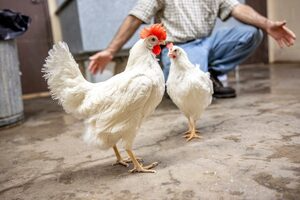- Tweet
- Printer Friendly
Highly Contagious Avian Influenza Confirmed In Virginia

On Jan. 19, 2023, the Virginia Department of Agriculture and Consumer Services confirmed the state's first positive case of Highly Pathogenic Avian Influenza in a flock of commercial turkeys in Rockingham County, Virginia. This is the third reported case in Virginia but the first in commercial poultry.
Poultry owners and industry members alike need to take precautions to protect their flocks from the incurable disease, says Michael Persia, a professor and Virginia Cooperative Extension specialist of poultry nutrition and management in the School of Animal Sciences in the College of Agriculture and Life Sciences.
Anyone involved with poultry production from the small backyard to the large commercial producer should review their biosecurity activities to assure the health of their birds. The Animal and Plant Health Inspection Service has materials about biosecurity, including videos, checklists, and an available toolkit.
"The disease could be economically devastating to the industry and could also cause backyard owners to lose their entire flock," Persia says. "To help protect flocks, it's important to take practical biosecurity measures to reduce and eliminate potential sources of infection."
"VDACS is working closely with the Virginia Poultry Federation, and USDA APHIS on a joint incident response. State officials quarantined the affected premises and are performing additional surveillance and testing within a 10-kilometer radius around the affected flock. The 25,000 birds on the affected property have been depopulated to prevent the spread of the disease. Birds from the flock will not enter the food system," according to a VDACS news release.
These safety measures include:
- Reduce and eliminate any interaction with wild birds, especially migratory waterfowl, that carry the disease
- Keep birds indoors. If not possible, keep the birds under cover outdoors.
- Use a dedicated pair of footwear for taking care of the birds to reduce the chance of bringing something into their habitat.
- Do not feed or provide water outside. Feeding and hydration should be done indoors, which discourages wild birds from interacting with the habitat.
- Wear clean clothes or have a dedicated coverall when interacting with the birds.
- Wash hands before and after any bird interactions.
- While poultry owners may not know if their birds have the disease, there are common symptoms of avian influenza which are often present:
- Unexplained mortality is common with this strain of avian flu. If unexplained mortality is seen, the Virginia Department of Agriculture and Consumer Services should be contacted immediately.
- The birds are quieter than normal.
- Decrease in feed or water intake.
- Diarrhea with a green hue.
- Sneezing or coughing, as avian influenza is a respiratory disease.
- Discolored and swollen face/head and hocks.
According to the U.S. Centers for Disease Control and Prevention, these avian influenza detections do not present an immediate public health concern.
As a reminder, the proper handling and cooking of poultry and eggs to an internal temperature of 165 degrees Fahrenheit kills bacteria and viruses.
Source: Virginia Department of Agriculture and Consumer Services news release